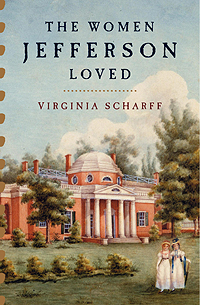 In reading and appreciating this book, context is all. Thomas Jefferson is viewed today as brilliant, dynamic, flawed, hypocritical and endlessly interesting as a leader and a man. In his time, remove "flawed" and the appraisal remains the same.
In reading and appreciating this book, context is all. Thomas Jefferson is viewed today as brilliant, dynamic, flawed, hypocritical and endlessly interesting as a leader and a man. In his time, remove "flawed" and the appraisal remains the same.
We view Jefferson's dalliance with Sally Hemings as more than a peccadillo; it was a shameful abuse of power. His contemporaneous males would find our attitude extremely jejune. Why shouldn't he bed her; he owned her.
And thereby hangs the tale of this book. Scharff gives us a candid view of the traditions of the time. The Founding Fathers had it all their own way, while the women became pregnant, lost children and died young. The men were more or less serially monogamous, except for the occasional visit to the shanties, and their work, which kept them away from home for long periods of time doing only God knows what. Slaves were part of the warp and woof of the time, especially in Virginia, where tobacco was the cash crop. Only people watched over with a whip would have withstood the rigors of the hot summers spent in stoop labor to bring in that crop.
Regardless of what we think about slavery or Jefferson or black-white intimacy, that's the way it was. He was not alone in his seduction of a young black woman: his family and his wife's family are replete with black-white half-siblings and cousins. In fact, Jefferson's only wife, Martha, was related to Sally--closely. "His father-in-law, John Wayles, was father not only to Jefferson's wife, Martha Wayles Skelton Jefferson, but also to Sally Hemings and five of her sisters and brothers, making Martha and Sally half-sisters."
Scharff starts out with the first woman Jefferson loved: his mother. She makes a good case for it, but other historians have held a less generous view. She gave birth to nine children, buried one or two--records differ--was widowed at 37 and took in orphaned grandchildren, ordered the slaves on the estate and coped with her revolutionary son's ideas.
Next comes Martha Skelton, a young widow, courted and won by the dashing Jeffersokn. He truly loved her, although their 10 years of marriage were fraught with failed pregnancies--only two children survived to adulthood. They shared a love of music--he played the violin, she the piano--and played and sang together often. "His passion for the woman who would become his only wife was fervent, lifelong and consequential." On her deathbed, Martha asked him never to marry again, and he agreed.
Another well-loved woman was Maria Cosway, one of Jefferson's Paris connections--married, Catholic and available for long afternoons, but perhaps not for anything else. That's the titillating part of this kind of book; we can know very little about what we'd like to know.
Scharff then brings in Patsy and Polly, Jefferson's daughters. One is left to suppose that he "loved" them much as other men of his time loved their daughters--lots of great letters, lip service and no time on the ground. He abandoned them periodically, much against their will and then called them back at his convenience, always protesting that he missed them sorely.
And then there's Sally. Is there anything we don't already know about her? She had seven children with Jefferson, a few of whom survived to adulthood to ratify conclusions already drawn long before.
In sum, Jefferson was an enigmatic genius, in that he could neatly separate the different parts of his life and still maintain a public persona that withstood the onslaught of rumors that almost brought down his Presidency. The original Teflon politician?--Valerie Ryan
Shelf Talker: Another entry into the ever-fascinating life of Thomas Jefferson, this time through the strong, resilient women he knew and loved.
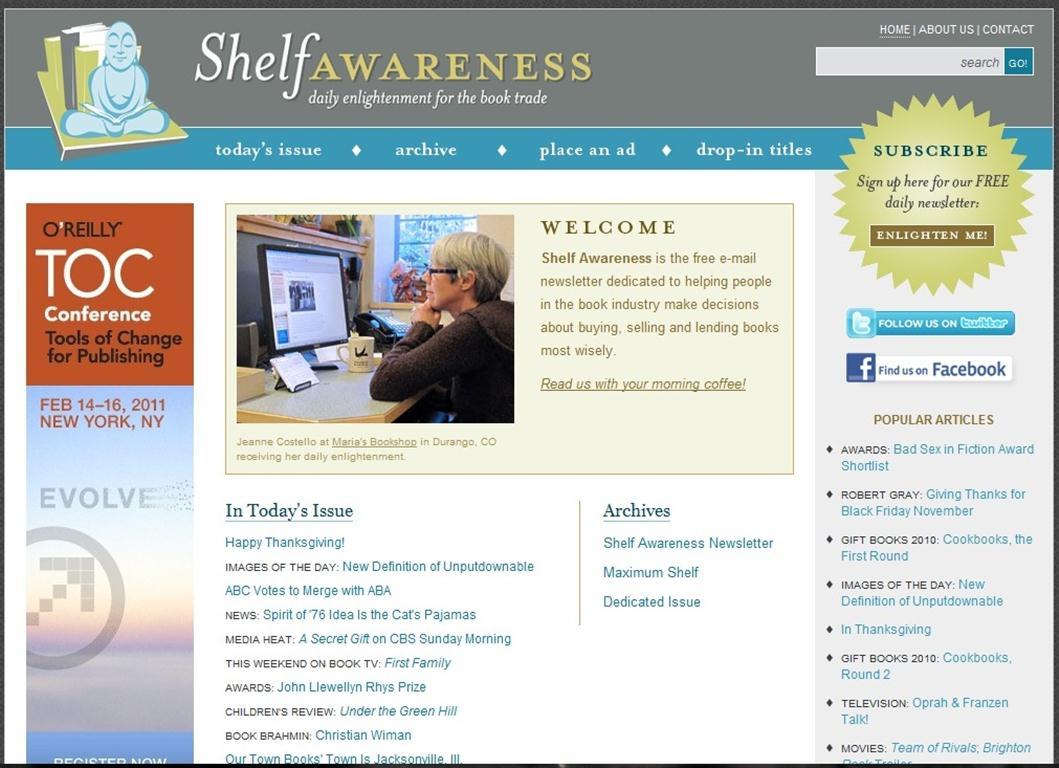 Shelf Awareness has launched a new version of our website, improving the layout, content and search functions to make it easier for users to find the information they need. You can browse popular articles, click on a book cover to read the review, find recent award announcements and learn about upcoming trade shows and consumer book fairs. In addition, we now can post breaking news and update important stories that we're covering fully here in the newsletter. The homepage also now features ads from the current issue of Shelf Awareness. And if you've ever wondered about the people behind Shelf Awareness, you can read our bios on the "about us" page.
Shelf Awareness has launched a new version of our website, improving the layout, content and search functions to make it easier for users to find the information they need. You can browse popular articles, click on a book cover to read the review, find recent award announcements and learn about upcoming trade shows and consumer book fairs. In addition, we now can post breaking news and update important stories that we're covering fully here in the newsletter. The homepage also now features ads from the current issue of Shelf Awareness. And if you've ever wondered about the people behind Shelf Awareness, you can read our bios on the "about us" page.









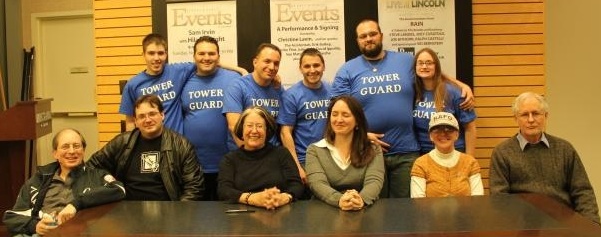

 Sarah Palin's appearance on behalf of her new book, America by Heart, at a Borders in West Des Moines, Iowa, drew many hundreds of fans, "at least five times the number of people who turned out here the previous week for Newt Gingrich," the
Sarah Palin's appearance on behalf of her new book, America by Heart, at a Borders in West Des Moines, Iowa, drew many hundreds of fans, "at least five times the number of people who turned out here the previous week for Newt Gingrich," the 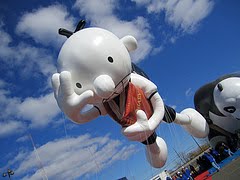 Wimpy Kid for President? While
Wimpy Kid for President? While 

 There was good news and murky news about Black Friday and Thanksgiving weekend sales.
There was good news and murky news about Black Friday and Thanksgiving weekend sales. According to comScore, Amazon.com was the most-visited website, with 25% more visitors on Black Friday this year than last year. Online sales on Thanksgiving Day rose 28%, to $407 million, the company said.
According to comScore, Amazon.com was the most-visited website, with 25% more visitors on Black Friday this year than last year. Online sales on Thanksgiving Day rose 28%, to $407 million, the company said. Several booksellers reported that American Express's small business Saturday program--which gave registered Amex customers a $25 credit if they made purchases at a small business--helped sales. As Annie Philbrick of Bank Square Books, Mystic, Conn., told the Day: "I would say that 80 percent of the people using their cards were aware of the benefit to the community and those that weren't aware of it said they would go home and register their cards."
Several booksellers reported that American Express's small business Saturday program--which gave registered Amex customers a $25 credit if they made purchases at a small business--helped sales. As Annie Philbrick of Bank Square Books, Mystic, Conn., told the Day: "I would say that 80 percent of the people using their cards were aware of the benefit to the community and those that weren't aware of it said they would go home and register their cards." The shortlist for the Pacific Northwest Booksellers Association's
The shortlist for the Pacific Northwest Booksellers Association's  Advice
books make great gifts-- they are often compact, which makes them more gifty,
they are meaningful, and they are (usually) received with thanks. Viva Editions
has published some very nice and nicely "sized books that are perfect for
presents. Change Your Life! A Little Book
of Big Ideas by Allen Klein ($14.95) is a book to inspire transformation, a
collection of quotations from all sorts of people, not just the usual--Reinhold
Niebuhr, Mary
Advice
books make great gifts-- they are often compact, which makes them more gifty,
they are meaningful, and they are (usually) received with thanks. Viva Editions
has published some very nice and nicely "sized books that are perfect for
presents. Change Your Life! A Little Book
of Big Ideas by Allen Klein ($14.95) is a book to inspire transformation, a
collection of quotations from all sorts of people, not just the usual--Reinhold
Niebuhr, Mary 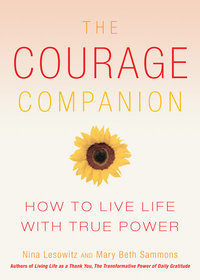 Tyler Moore, Satchel Paige, Bat Masterson, Annie Dillard--arranged
by subjects like "Forget Failure" and "Have Hope, Help Others."
Going a bit deeper is The Courage
Companion: How to Live Life with True Power by Nina Lesowitz and Mary Beth
Sammons ($15.95). The authors write about people who have faced the worst, or
taken a big step without a net, and managed to confront their fears. Each
chapter has three personal stories, a sidebar and a power practice, like five
tips for managing your fears after job loss, or a book recommendation, or a
quotation.
Tyler Moore, Satchel Paige, Bat Masterson, Annie Dillard--arranged
by subjects like "Forget Failure" and "Have Hope, Help Others."
Going a bit deeper is The Courage
Companion: How to Live Life with True Power by Nina Lesowitz and Mary Beth
Sammons ($15.95). The authors write about people who have faced the worst, or
taken a big step without a net, and managed to confront their fears. Each
chapter has three personal stories, a sidebar and a power practice, like five
tips for managing your fears after job loss, or a book recommendation, or a
quotation. 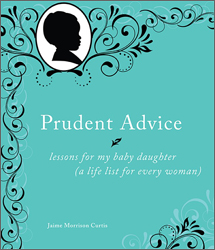 Andrews
McMeel has published a winning book by Jaime Morrison Curtis: Prudent Advice. Curtis has a baby
daughter and started compiling advice for her, which turned into "a life
list for every woman." It's a hardcover, and at $12.99 and 200 pages, it's
tough to beat as a gift suggestion. Of course, the content has to be good, and
is it ever: #163: Learn how to drive a stick shift. #428: Preface a difficult
conversation by acknowledging it. #285: Never park in the handicapped spot. #83:
Sometimes you will feel alone. #203. Return your shopping cart. #222: If love
were enough, no one would ever die. Curtis expands on most of her advice (on
appreciating the weather, she says, "It is one of the few uncontrolled
experiences of nature you will have if you live in the city.") with
wisdom, wit and love.
Andrews
McMeel has published a winning book by Jaime Morrison Curtis: Prudent Advice. Curtis has a baby
daughter and started compiling advice for her, which turned into "a life
list for every woman." It's a hardcover, and at $12.99 and 200 pages, it's
tough to beat as a gift suggestion. Of course, the content has to be good, and
is it ever: #163: Learn how to drive a stick shift. #428: Preface a difficult
conversation by acknowledging it. #285: Never park in the handicapped spot. #83:
Sometimes you will feel alone. #203. Return your shopping cart. #222: If love
were enough, no one would ever die. Curtis expands on most of her advice (on
appreciating the weather, she says, "It is one of the few uncontrolled
experiences of nature you will have if you live in the city.") with
wisdom, wit and love. A bit of
wisdom so often given to artists and writers is the impetus behind a fine
collection of essays from MP Publishing/PGW: Don't Quit Your Day Job: Acclaimed Authors and the Day Jobs They Quit,
edited by Sonny Brewer ($24.95). When Brewer contacted authors for the essays,
he asked them how the day jobs they quit informed their art years later, and
Rick Bragg answered, "Oh, drop the pretentious literary bullshit. The
pick-and-shovel work I did informed me there was an easier way to make a damn
living." Brewer has included 23 writers in the book--Tom Franklin,
Joshilyn Jackson, George Singleton, John Grisham, to name a few--and if you've
ever marveled at author dust jacket bios ("She has been a waitress, a
long-haul trucker, a teacher and a combat photographer, and now divides her
time between Nanucket and Provence"), this is for you-- the real scoop.
Silas House was a rural mail carrier, Daniel Wallace was a vet tech, Clay Risen
worked in a call center, Tim Gatreaux was a crab scrubber, Janis Owens was and
is a kept woman (by her husband of 30 years). As Brewer says, the authors tell
good tales.
A bit of
wisdom so often given to artists and writers is the impetus behind a fine
collection of essays from MP Publishing/PGW: Don't Quit Your Day Job: Acclaimed Authors and the Day Jobs They Quit,
edited by Sonny Brewer ($24.95). When Brewer contacted authors for the essays,
he asked them how the day jobs they quit informed their art years later, and
Rick Bragg answered, "Oh, drop the pretentious literary bullshit. The
pick-and-shovel work I did informed me there was an easier way to make a damn
living." Brewer has included 23 writers in the book--Tom Franklin,
Joshilyn Jackson, George Singleton, John Grisham, to name a few--and if you've
ever marveled at author dust jacket bios ("She has been a waitress, a
long-haul trucker, a teacher and a combat photographer, and now divides her
time between Nanucket and Provence"), this is for you-- the real scoop.
Silas House was a rural mail carrier, Daniel Wallace was a vet tech, Clay Risen
worked in a call center, Tim Gatreaux was a crab scrubber, Janis Owens was and
is a kept woman (by her husband of 30 years). As Brewer says, the authors tell
good tales. Advice of a
different sort comes from the Wisconsin Historical Society Press, which can
always be relied on to publish neat books (it's hard to top 2009's People of the Sturgeon, though). This
one is Penny Loafers and Bobby Pins:
Tales and Tips from Growing Up in the '50s and '60s by the Sandvidge
sisters--Susan, Diane, Jean and Julie ($18.95). The tales and tips are
illustrated with period photos, a few recipes and wise words from mom: "There's
still some wear in that." If you want to know about, or have forgotten,
life before pantyhose, Lucky Strikes, autograph books or TV shows like Sky King, this book will explain it all.
You can learn how to get bouncy '50s hair with pincurls, how to tie a scarf
like Audrey Hepburn, and how to survive long sermons or high mass. What a great
book to share with parents, siblings or children.
Advice of a
different sort comes from the Wisconsin Historical Society Press, which can
always be relied on to publish neat books (it's hard to top 2009's People of the Sturgeon, though). This
one is Penny Loafers and Bobby Pins:
Tales and Tips from Growing Up in the '50s and '60s by the Sandvidge
sisters--Susan, Diane, Jean and Julie ($18.95). The tales and tips are
illustrated with period photos, a few recipes and wise words from mom: "There's
still some wear in that." If you want to know about, or have forgotten,
life before pantyhose, Lucky Strikes, autograph books or TV shows like Sky King, this book will explain it all.
You can learn how to get bouncy '50s hair with pincurls, how to tie a scarf
like Audrey Hepburn, and how to survive long sermons or high mass. What a great
book to share with parents, siblings or children. 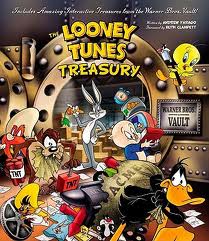 Speaking of
the '50s and '60s (and earlier), remember Looney Tunes? Running Press has just
published The Looney Tunes Treasury
by Andrew Farago ($45), and what a treasure it is. As one would expect, it's
filled with art and text, but also with inserts like a Tasmanian Devil mask, a
Tweety and Sylvester comic, a facsimile script for Bugs Bunny's "Rabbit
Hood" and much more. My favorite is the Acme Catalog from the Roadrunner
cartoons, used by Wile E. Coyote in his pursuit of the wilier bird: iron birdseed
loaded with buckshot to weigh the roadrunner down ("30% of birds have an
iron deficiency. 90% of predators have a bird deficiency."), invisible
paint, a fake hole ("Perfect for summer chases or visiting relatives.").
We need more laughs today, and this book delivers.--
Speaking of
the '50s and '60s (and earlier), remember Looney Tunes? Running Press has just
published The Looney Tunes Treasury
by Andrew Farago ($45), and what a treasure it is. As one would expect, it's
filled with art and text, but also with inserts like a Tasmanian Devil mask, a
Tweety and Sylvester comic, a facsimile script for Bugs Bunny's "Rabbit
Hood" and much more. My favorite is the Acme Catalog from the Roadrunner
cartoons, used by Wile E. Coyote in his pursuit of the wilier bird: iron birdseed
loaded with buckshot to weigh the roadrunner down ("30% of birds have an
iron deficiency. 90% of predators have a bird deficiency."), invisible
paint, a fake hole ("Perfect for summer chases or visiting relatives.").
We need more laughs today, and this book delivers.-- In reading and appreciating this book, context is all. Thomas Jefferson is viewed today as brilliant, dynamic, flawed, hypocritical and endlessly interesting as a leader and a man. In his time, remove "flawed" and the appraisal remains the same.
In reading and appreciating this book, context is all. Thomas Jefferson is viewed today as brilliant, dynamic, flawed, hypocritical and endlessly interesting as a leader and a man. In his time, remove "flawed" and the appraisal remains the same.